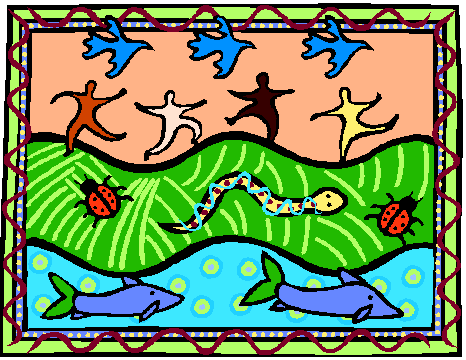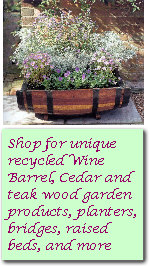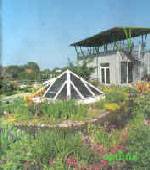|


Related Topics

| |
What is Green Roof?
Green roofs
involve growing plants on rooftops, thus replacing the vegetated footprint
that was destroyed when the building was constructed. Germany is widely
considered the leader in green roof research, technology and usage. It is
estimated that 12% of all flat roofs in that country are green and the German
green roof industry is growing 10% to 15% per year. Modern green roofs can be
categorized as ‘intensive’ or ‘extensive’ systems depending on the plant
material and planned usage for the roof area. Intensive green roofs utilize a
wide variety of plant species that may include trees and shrubs, require
deeper substrate layers (usually > 10 cm (4 in)), are generally limited to
flat roofs, require ‘intense’ maintenance, and are often park-like areas
accessible to the general public. In contrast, extensive roofs are limited to
herbs, grasses, mosses, and drought tolerant succulents such as Sedum, can be
sustained in a shallow substrate layer (< 10 cm (4 in)), require minimal
maintenance, and are generally not accessible to the public.
Benefits of Green roof,
As our forests and agricultural lands are
replaced with impervious surfaces due to urban development, the necessity to
recover green space is becoming increasingly critical for the health of our
environment as well as our well-being. Vegetated or green roofs are one
potential remedy for this problem. Establishing plant material on rooftops
provide numerous ecological and economic benefits including storm water
management, energy conservation, mitigation of the urban heat island effect,
increased longevity of roofing membranes, as well as providing a more
aesthetically pleasing environment to work and live. The mitigation of storm
water runoff is considered by many to be the primary benefit because of the
prevalence of impervious surfaces in urban areas. The rapid runoff from roof
surfaces can exacerbate flooding, increase erosion, and may result in raw
sewage that is discharged directly into our rivers. The larger amount of
runoff also results in a greater quantity of water that must be treated before
it is potable. A major benefit of green roofs is their ability to absorb storm
water and release it slowly over a period of several hours. Green roof systems
have been shown to retain 60-100% of the storm water they receive. In
addition, green roofs have a longer life-span than standard roofs because they
are protected from ultraviolet radiation and the extreme fluctuations in
temperature that cause roof membranes to deteriorate. Furthermore, the
construction and maintenance of green roofs provide business opportunities for
nurseries, landscape contractors, irrigation specialists, and other green
industry members while addressing the issues of environmental stewards
Future of Green roof
In Germany, it is estimated 12% of all flat-roofed
buildings are covered with vegetation, a number that is increasing as the
German green roof industry continues to grow 10 to 15% per year. In Michigan
and the rest of North America the concept of green roofs is just now being
introduced. A few installations exist on this continent, the largest extensive
roof (10.4 acres) being the new assembly plant at the Rouge facility of Ford
Motor Co. in Dearborn, Mich.
Will green roofs ever catch on in the United States
like they have in Europe? Several barriers to widespread acceptance exist such
as a lack of awareness regarding green roofs, potentially higher installation
costs, limited quantifiable data pertaining to the benefits they provide, no
technical information on how to build them, and a lack of government
incentives or tax breaks. However, all of these problems are currently being
addressed. These barriers are not insurmountable, as the same barriers have
been overcome in Germany. In the U.S. the concept of green roofs is just now
being introduced and will likely become more common in the future. They
represent an entirely new market for landscape designers/architects, nursery
operations, and landscape contractors; and the potential market includes all
existing and future roofs in the country.
Green roof can be also started with a smaller scale
like using cedar wood rooftop planter
container or raised bed that are
specially designed for the rooftop, they are less expansive and can be install
relatively easy with simple tool, since they are not as extensive as the cover
all greenroof type that generally you do not need a structural engineer to
design and build the system for you, it is DIY project that can be done in a
weekend or two.
|
![]() Gardeners' Corner
Kids'
Garden
Sustainable Garden
Contact Us
Gardeners' Corner
Kids'
Garden
Sustainable Garden
Contact Us![]()


